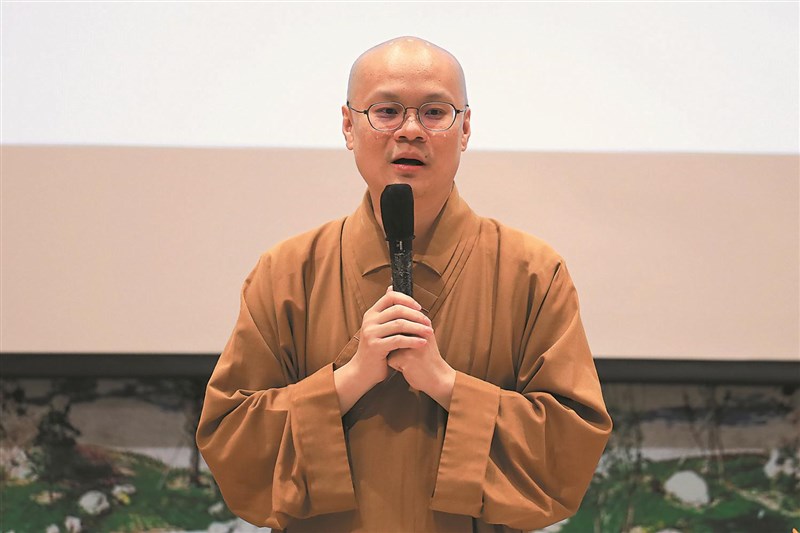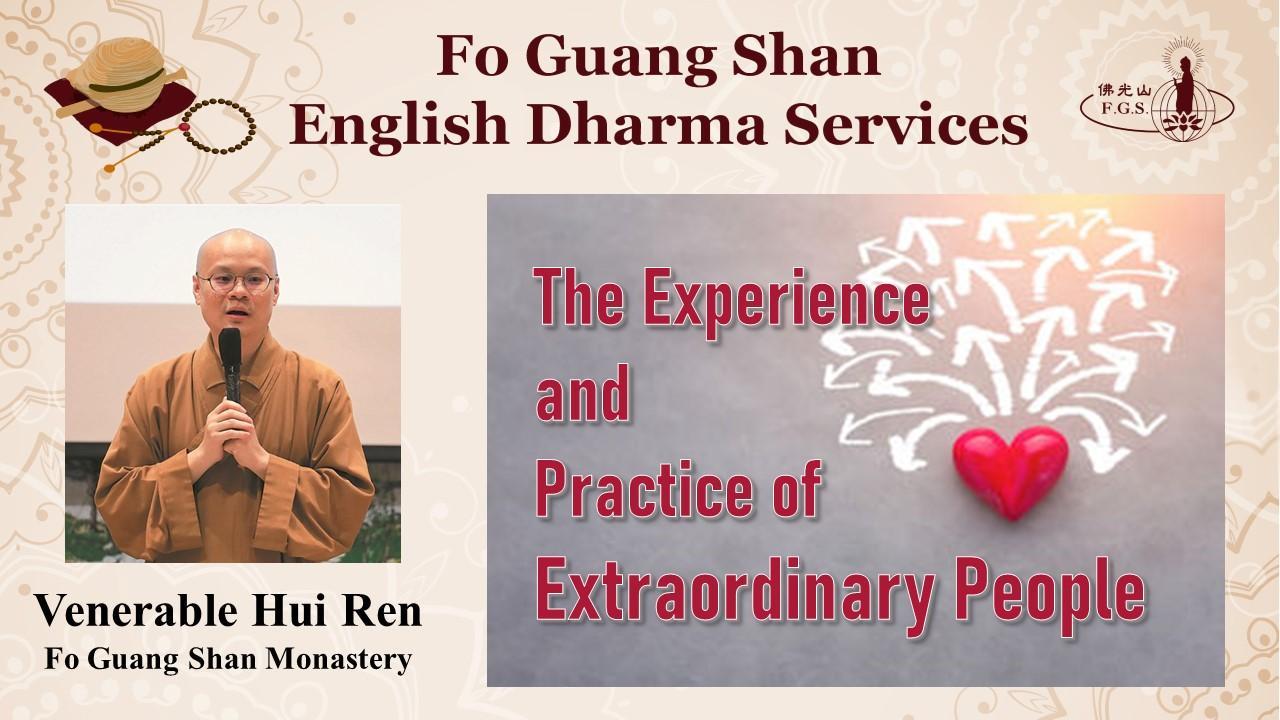
Speaker: Ven. Hui Ren
Fo Guang Shan Monastery
I. Introduction
Auspicious blessings to all dharma brothers and sisters online, welcome to the FGS English Dharma Services. My name is Hui Ren from Fo Guang Shan Monastery.
Today, I would like to discuss about the Extraordinary People in Buddhism from the Perspective of Loving-kindness and Compassion.
In today’s connected society, it’s not unusual for ordinary people to encounter unusual situations and take extraordinary actions. While this may seem like it is a recent phenomenon, ancient texts show us that ordinary people have encountered extraordinary situations for eons. Today, we will look back at a few of these occurrences. Our goal is to gain an understanding of the trials and tribulations these people faced and the wisdom they learned from their experiences.
II. What are “Extraordinary People”?
Who are the “extraordinary people”? They are people that learned the virtues of extraordinary patience, commitment, wisdom, loving-kindness, and compassion. By learning these virtues, they gained a special understanding of the meaning of life, and they were liberated from earthly worries as well as the cycle of birth and death. They liberated themselves during difficult times in their lives.
In today’s dharma talk, we will look at these extraordinary people in Buddhism from the perspective of loving-kindness and compassion, to see what we can learn from the wisdom they gained through their experiences and practices.
In Buddhism there have been many people with great loving-kindness and compassion. When they saw sentient beings suffering, they also suffered. To liberate sentient beings from extremely miserable conditions, they would not hesitate to sacrifice their own life and body. The spirit of “practicing benevolence and kindness and helping people with a universal love” has created many extraordinary people and stories in Chinese Buddhism.
III. Extraordinary People 1: Living Buddha of Jinshan
The Living Buddha of Jinshan treated illness. If a patient had an abscess, he would suck on the abscess, despite the filth. Moreover, he would swallow the pus and blood that he sucked out so that the patient would not be disgusted when seeing the pus. This “ability to do difficult and rare” action is the spirit of loving-kindness and compassion that touches everyone.
Most of us know what compassion is, and most of us practice compassion, but not many possess an in-depth understanding of the actual meaning that lies behind it. One might then ask, what is the real meaning of compassion? Some say compassion is love, but many impure forms of love cause nothing but pain and suffering. Compassion is purified love. It is a kind of service offered out of selflessness and wisdom; it is a form of contribution made without expecting anything in return; it is a sacrifice made out of resolve; and it is a combination of love, wisdom, resolve, and generosity.
IV. Extraordinary People 2: Master Kuya
One night while Japanese Master Kuya was meditating, a vicious bandit broke into the master’s room. He was holding a shiny steel knife, threatening to take Master Kuya’s money. Master Kuya emptied his boxes and drawers, and gave all his belongings to the bandit as he burst into tears, the bandit talked to him with contempt: “What a useless master. You monastics should have already forgone everything in the world. Such little money should not be worth crying over, as if you were losing your parents.”
“I felt sad and wept not for losing money, but for you.” The Chan master continued, “You have killed and committed robbery, so you have already planted the seeds of being reborn in the lower realm. I was crying for you going down to hell to endure immeasurable suffering.”
As sutras say, “Bodhisattvas fear causes; sentient beings fear effects.” Ordinary, ignorant sentient beings covet only momentary enjoyments, even if the enjoyment is gained from misconduct, and do not care about the suffering from the effect of their bad actions. It is similar to licking honey from a sword. Although the honey is tasted, the tongue is also cut. With boundless wisdom, bodhisattvas see and clearly understand that pleasure through the five desires and six sense objects is the root of extreme suffering in the future; therefore, with endless compassion, bodhisattvas use skillful means to teach sentient beings to abandon momentary, illusory pleasure, and to pursue the ultimate bliss of nirvana.
Sadaprarudita, known as the Ever Willing Bodhisattva, often sobbed for sentient beings, because when he saw sentient beings in the unwholesome world-suffering from poverty, aging, sickness, worries, and agony-he identified with their suffering. Master Kuya’s tears reveal the concern that all bodhisattvas have for sentient beings. The sorrows that all bodhisattvas have for sentient beings are in Master Kuya’s tears.
IV. Extraordinary People 3: Chan Master Sengqun
Chan Master Sengqun of the Jin dynasty was indifferent to fame and wealth throughout his life. He lived in seclusion in Mount Hou. His house was simple and crude. His diet was vegetarian and light. He felt comfortable in poverty and practiced the Way. Mount Hou is an isolated island in an ocean. There was a stone basin on the top of the island, about six to seven meters deep. A clear spring gurgled and flowed out the basin. The basin water smelled great and tasted sweet; it was just like drinking sweet dew and nectar. Chan Master Sengqun drank the spring water every single day to allay his hunger, instead of eating grain. Separating his hay hut and the stone basin there was a clear stream. The Chan master thus built a wooden bridge over the stream so he could reach the basin each the basin each day and soothe his hunger.
One day as the Chan master was walking across the bridge with his water bag, he saw a duck with broken wings resting on the tiny bridge. The duck saw the master coming and extended its neck to show resistance. The Chan master was considering staving off the duck with his walking staff, but he also worried that he might hurt the duck. Instead of hurting the duck, he returned home with his empty water bag and empty stomach. The next day the Chan master went to get water and the duck was still standing on the bridge, with his neck extended. The Chan master could not do anything but hold his hunger and return home. The next morning the master again went to get water. The duck still had not left the bridge. The duck remained on the bridge for several more days. Because the master was afraid of scaring the duck, he had not had any water for many days and finally died of dehydration.
The spirit of sacrifice that the virtuous ancients had to “devote themselves only for the sake of liberating sentient beings from suffering, and not to pursuing peace and happiness for themselves” exemplifies the Buddha’s kind and compassionate mind.
IV. Extraordinary People 4: Master Fajing
Master Fajing of the Wei and Jin dynasties was highly respected by government officials and civilians because of his wisdom and compassion. Once, an area was suffering from famine. Corpses from starvation were all over; it was a miserable situation. Master Fajing therefore fasted, cleaned his body, and carried knives and salt to the stone caves in a mountain where starving people were gathered. He taught the starving victims and helped them take refuge in the Triple Gem (the Buddha, the Dharma, and the Sangha). After the Triple Gem Ceremony, he hung his robe on a tree and spoke kindly: “I am here to make an offering of my life to everyone today. Please take the flesh from my body to fulfill your hunger.”
When everyone saw the master whom they highly respected willingly sacrificing himself to save their lives, they were hesitant to do it. Master Fajing had to lift the knife, cut off his own flesh, sprinkle some salt on it, and serve it in dishes to everyone. No one was able to fight against the suffering of their hunger; they had no other option but to swallow Master Fajing’s clean flesh with their tears. In order to save more sentient beings, Master Fajing overcame his fear of physical pain and sacrificed his life with boundless joy.
V. Conclusion
When the Buddha was practicing in his casual practice, he also cut off his flesh to feed an eagle and sacrificed his body to feed a tiger. This is how he finally accomplished the bodhisattva path of carrying out what is arduous and enduring what is difficult to endure. In the bodhisattvas’ eyes, all sentient beings and bodhisattvas are of one body. Having loving-kindness and compassion to benefit sentient beings is the path to accomplishing Buddhahood. Becoming Buddhas and bodhisattvas is the result of their great compassion for all sentient beings. This great awakens the mind. Therefore, among sentient beings is where we practice the bodhisattva path; with loving-kindness and compassion, all the torments and difficulties that sentient beings may bring to us will become ghee and sweet dew to us.
Thank you so much for listening! Please join palms and dedicate the merit from this dharma talk to all sentient beings. May you find peace and joy in this dharma talk
Don’t forget to subscribe to our channel FGS “English Dharma Services” for more Dharma wisdom contents. Omitofo.

